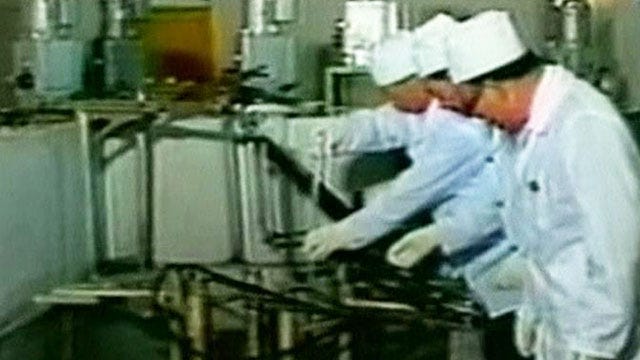The Pentagon confirmed Tuesday that it is positioning an array of military assets near the Korean Peninsula, as the White House stressed that the "entire national security team" is focused on the escalating threats out of Pyongyang -- with the latest being a pledge to restart a key nuclear reactor.
Secretary of State John Kerry, speaking Tuesday at a news conference with the visiting foreign minister of South Korea, said recent belligerent rhetoric from North Korea is "unacceptable" and that the U.S. will defend itself, as well as South Korea and Japan, from any threat from the North.
The amount of hostile language from North Korea in recent weeks was "extraordinary," Kerry said, adding that the isolated state should have no doubt that the U.S. will fulfill its treaty obligations to allies in the region.
Pentagon spokesman George Little said that two destroyer warships, the USS Decatur and USS McCain, have arrived in the region as part of a missile-defense mission. Previously, the Pentagon had only revealed that it had moved the USS McCain to the region.
"They have arrived at predetermined positions in the western Pacific, where they will be poised to respond to any missile threats to our allies or our territory," Little said Tuesday.
In addition, the Pentagon has already announced plans to have two sea-based radar systems in the western Pacific. One is already in northern Japan; the other has not yet deployed and is currently conducting non-North Korean related systems tests off Pearl Harbor.
The system in Japan can serve to protect the Korean peninsula as well as threats to the western United States that originate from North Korea.
"I am not going to get into specifics of where our assets are in South Korea or elsewhere, but we stand ready to defend South Korea from external threats, wherever they may originate," Little said, while also calling for "the temperature to be taken down."
Meanwhile, U.S. officials on Tuesday condemned North Korea's latest threat to restart a nuclear reactor that can make one bomb's worth of plutonium a year. The plutonium reactor was shut down in 2007 as part of international nuclear disarmament talks that have since stalled. The declaration of a resumption of plutonium production -- the most common fuel in nuclear weapons -- and other facilities at the main Nyongbyon nuclear complex will boost fears in Washington and among its allies about North Korea's timetable for building a nuclear-tipped missile that can reach the mainland U.S., technology it is not currently believed to have.
State Department spokeswoman Victoria Nuland said it would be "extremely alarming" if North Korea followed through on the vow to restart the reactor, though added that there was "a long way to go" between the North stating an intention and following through on it.
Nuland spoke ahead of a meeting between Secretary of State John Kerry and South Korean Foreign Minister Yun Byung-se.
White House spokesman Jay Carney said the U.S. is taking steps to ensure it has the capacity to defend itself and its allies, and that President Obama is being updated regularly.
"The entire national security team is obviously focused on this, as you would expect," Carney said.
But Carney noted that a string of threats from North Korea toward the U.S. and South Korea so far have not been backed up by action, calling the threats part of a counterproductive pattern. He called on Russia and China, two countries he said have influence on North Korea, to use that influence to persuade the North to change course.
A spokesman for North Korea's General Department of Atomic Energy said Tuesday scientists will quickly begin "readjusting and restarting" the facilities at its main Nyongbyon nuclear complex, including the plutonium reactor and a uranium enrichment plant. Both could produce fuel for nuclear weapons.
Fox News' Justin Fishel and The Associated Press contributed to this report.





